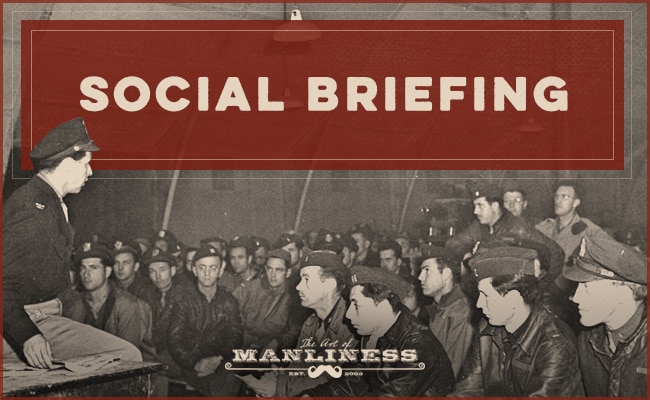
Social Briefings are short bi-monthly dispatches that offer practical tips to improve your social skills. Read more on their raison d’etre.
Have you ever been on a first date, and, after having run through questions on what the other person does for a living, and how many siblings she has, been stumped as to what else to ask?
Or have you been at a dinner party where you drew a blank as to what questions to pose to the other guests?
In our last social briefing, we talked about what are generally the best types of questions to ask: those which are open-ended.
But how do you think of questions to ask people at all? It can be hard to come up with them when you’re nervously talking to someone new, and even sometimes when you’re speaking at length with an old friend.
When your conversation hits a snag, here are some strategies for coming up with questions that’ll get things going again:
Observe. One of the easiest and best ways to come up with questions — especially for new acquaintances — is simply to observe people and their surroundings: look at the pictures/diplomas hanging on their walls, check out their clothing, peruse what’s on their bookshelves, etc.:
- I see you got your Ph.D from George Washington University. What brought you to that school?
- Looks like you’re reading The Better Angels of Our Nature. Do you find his argument convincing?
- I see you’re a fan of Jimmy Eat World. What do you think of their latest album?
- Tell me about this picture. Is that you on the dirt bike?
- How do you like your Silverado?
- Where did you get that snazzy tie?
Use the “free information” people give you. Conversations are littered with tons of what communications expert Alan Garner calls “free information.” Whenever you ask questions, and someone reveals something about themselves, you simply request some clarification or expansion on that point. Such follow-ups will often take the conversation this way and that, which is fine; it’s quite normal for a conversation to change topics every couple minutes.
Here’s an example of using “free information” you’re given to come up with questions:
You: Where are you from?
Them: Oh, all over the place. My dad was in the Army when I was growing up and we moved a lot.
You: Did you find that difficult?
Them: Not really. I mean it was hard always being the new kid in school, but I kind of liked the adventure of traveling, and it taught me how to be more outgoing and meet and talk to new people.
You: Is that part of what drew you into sales?
Them: Probably. I figured I’d be pretty good at it, and it has been an easy fit in many ways. But I’ve also found I’m really not suited for other aspects of the job.
You: Yeah? What are some things about your job you’ve struggled with?
As the conversation meanders to different topics, watch people’s faces and expressions for when you strike upon what Garner calls a “conversational hot spot” — a subject the person gets especially animated about and clearly enjoys discussing. Then make an effort to open up this vein of conversation further.
Of course, you don’t only have to talk about what interests the other person; conversation should be enjoyable for you too! You should ideally keep a “dual perspective”: looking for topics in which both you and the other person share a mutual interest.
FORM a question in your mind. What can you do when a conversational thread, for all its twists and turns, has run its course, but you can’t think of a new topic to introduce? Use the acronym FORM to figure out a subject to surface and form a question to pose (some of the below questions are obviously suited to a new acquaintance, while others are for those you already have a relationship with):
- Family. Do you keep in good touch with your siblings? How’s Joey taken to his new school? What’s your brother doing these days? How’s your grandpa’s health?
- Occupation. Will the new regulations that were just passed affect your line of work? How’s business been? Did you ever close that deal? Has your boss still been antagonizing you? What are the best and worst parts of your job?
- Recreation. What do you enjoy doing for fun after work? Are you still running these days? Have you gone on any camping trips lately? What’s the latest thing you’ve built in your workshop? Seen any good movies lately? Read any good books?
- Motivation/Meaning. Where do you hope to be in five years? Any goals you’ve been working on lately? Why did you decide to pick up tennis? Why did you decide to switch churches?
Plan ahead. Even when you’re meeting up with old friends, it’s helpful to think of conversational topics you want to surface, and questions you want to ask beforehand. You may wish to brainstorm some questions as you make your way over to meet them.
Perhaps you’ve seen some pictures they’ve posted on social media you’d like to ask them more about. Think about situations with their family and work that you discussed last time that you could ask for an update on. Have they gone on any vacations or participated in any sporting events since you last saw them? Have their children hit new milestones? Were they reading a book recently that they’ve likely now finished? All such things constitute good fodder for questions.
While such planning may seem “artificial,” paradoxically enough, the more you prepare, the more naturally the conversation will flow.


